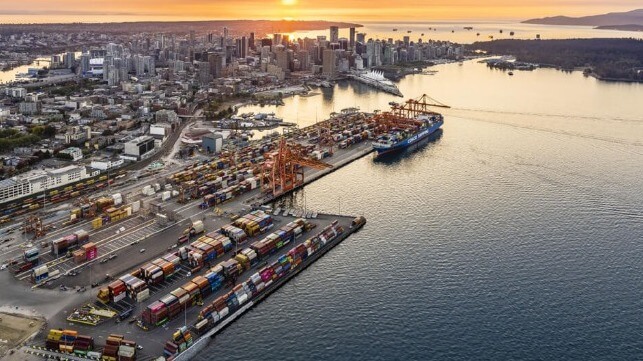Canadian ILWU Authorizes Potential West Coast Port Strike

In a nearly unanimous vote, the members of the International Longshore and Warehouse Union of Canada gave their leaders a mandate to call a strike if necessary in their ongoing contract negotiations. The potential of a strike that would impact Canada’s West Coast ports including Vancouver and Prince Rupert raised the further prospects of disruptions not only to the flow of commerce in Canada but also to the U.S. as disruptions are building in the U.S. West Coast ports.
The ILWU concluded two days of voting held on June 9 and 10 reporting yesterday to members that 99.24 percent have voted in favor of supporting a potential strike if necessary against the member companies of the BC Maritime Employers Association (BCMEA). The union represents more than 7,000 dock workers at Canada’s West Coast terminals operated by the 49 member companies of BCMEA.
Officials pointed out that talks are continuing between the two sides during a 21-day cooling off period imposed under Canadian labor law. Both sides have agreed not to take any actions before June 21 and then the union would be required to make a 72-hour advance notice of any planned action. The earliest a strike could happen is June 24.
It is the latest step in the dispute that began even before the contract expired on March 31. Talks had been expected to start in January but were delayed till February. Weeks later, even before the expiration, the ILWU filed for federal government mediation saying there was no progress. The mediation ran from March 28 to May 30 and is followed by the mandated cooling-off period.
“We want to avoid another disruption that risks fueling inflation and higher prices for consumers and businesses so soon after the devastation inflicted by the COVID-19 pandemic, heat domes, and catastrophic flooding,” said Bridgitte Anderson, President and CEO of the Greater Vancouver Board of Trade. The non-profit group which represents Canadian businesses warns a disruption in port operations would severely impact manufacturing, retail, agriculture, critical minerals, automotive dealers, and energy industries across the country.
The group highlights that a sixth of Canada’s international trade, approximately US$260 billion, moves through the ports of Vancouver and Prince Rupert annually. The two ports are the primary container terminals for Canada in its trade with Asia moving everything from electronics to apparel as well as exports. Vancouver handles approximately 4 million TEU annually while Prince Rupert has an annual capacity of 1.35 million TEU.

that matters most
Get the latest maritime news delivered to your inbox daily.
While the majority of the container volume is destined for Canadian businesses, estimates highlight that between 10 and 15 percent of the overall volume is being shipped to the U.S. via rail links primarily into the Midwest. They warn that the U.S. auto industry as well as manufacturers would also be impacted by a job action in the two Canadian ports. With growing disruption in the U.S. ports, and especially neighboring Seattle, the Canadian ports could serve as an alternative if shippers further seek to diver volumes away from the U.S.
